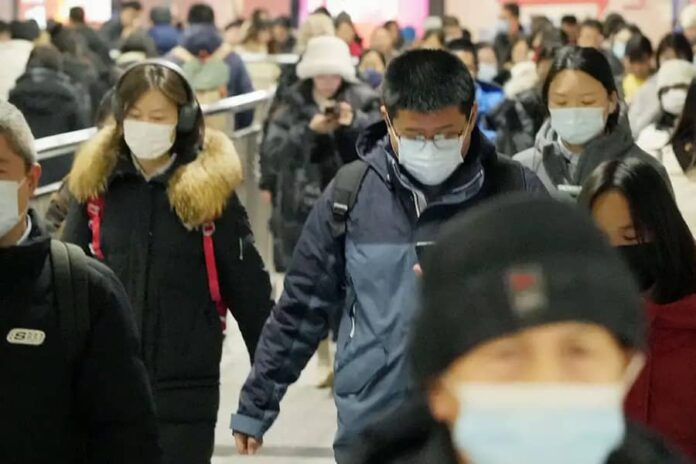In Beijing, officials are trying to downplay the recent spike in respiratory infections, which coincidentally comes five years after the world first learned about Covid-19.
Right now, China is seeing a rise in cases of a virus called human metapneumovirus (HMPV), especially among kids in northern provinces. This increase has led to reports of overcrowded hospitals and growing public anxiety about a potential outbreak.
Social media is buzzing with images and videos of people wearing masks in hospitals, prompting comparisons to the early days of Covid. In response, health authorities are rolling out new measures to keep an eye on pneumonia cases that don’t have clear causes. However, Beijing insists that this is just part of the usual winter pattern.
Mao Ning, a spokesperson for China’s foreign ministry, noted on Friday that respiratory infections typically peak during winter and emphasized that this year’s cases seem less severe and more contained than last year’s.
What is HMPV?
Human metapneumovirus, often referred to as HMPV, is a respiratory bug that can make you feel a lot like you have a cold or the flu. Generally, it’s not too serious, but it can lead to more severe issues like pneumonia, especially in vulnerable groups such as babies, older adults, and people with weakened immune systems.
Although HMPV isn’t a new virus—first discovered back in 2001—it’s recently been making headlines due to an uptick in cases among kids under 14 in northern China. This single-stranded RNA virus spreads mainly through respiratory droplets or by touching surfaces that have the virus on them.
We’ve seen cases pop up in various countries, including the UK. The symptoms typically include a cough, fever, stuffy nose, and fatigue, with an incubation period of about three to six days. Unlike Covid-19, there isn’t a vaccine or specific antiviral treatment for HMPV; instead, treatment focuses on alleviating the symptoms.
There’s been an uptick in HMPV cases over in China.
You know how when the weather gets colder, everyone tends to stay indoors more? Well, that seems to be happening now, and it’s leading to a rise in respiratory virus cases.
Health officials are saying this spike is pretty normal for this time of year. Just recently, China’s National Disease Control and Prevention Administration noted an uptick in respiratory infections like HMPV as winter sets in.
The World Health Organization (WHO) hasn’t called it a global health emergency yet, but because of the increase in cases, authorities are stepping up their monitoring efforts.
They’ve even started a pilot program aimed at tracking pneumonia cases that don’t have a clear cause. This way, labs and health agencies can report and handle these situations more efficiently—at least that’s what an official shared during a news conference reported by CCTV.
Is it possible for the HMPV virus to make its way to other countries?
Hong Kong has seen a few cases of HMPV, and nearby countries like Cambodia and Taiwan are keeping a close eye on the situation. Cambodia’s Communicable Disease Control Department has put out alerts about HMPV, pointing out that it’s similar to Covid-19 and the flu.
Meanwhile, Taiwan’s Centers for Disease Control have highlighted that this virus poses greater risks for kids, seniors, and those with weakened immune systems.
Over in India, officials are saying there’s no reason to panic since HMPV behaves like any other respiratory virus. There’s also been chatter about a metapneumovirus outbreak in China.
Just to clarify, Dr. Atul Goel from the Directorate General of Health Services mentioned that metapneumovirus acts like other respiratory viruses that can cause colds and may lead to flu-like symptoms in very young or elderly people.
To reassure everyone, a spokesperson from China’s foreign ministry emphasized that the Chinese government is committed to the health of both its citizens and visitors, assuring that it’s safe to travel throughout China.
